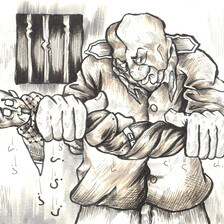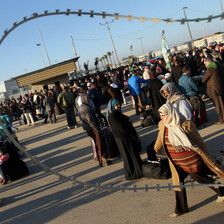The Electronic Intifada Dahmash 6 May 2015

Thousands of Palestinian citizens protest against home demolitions in central Tel Aviv on 28 April.
ActiveStillsWhen hundreds of Israeli police and border patrol officers arrived in the village of Dahmash at 3am on 15 April, they sealed off the homes and forbade local residents from venturing outside. Within two hours, their bulldozers had torn through homes.
Eighteen members of the Assaf family, including several children, were left homeless. In total, five apartments in three different buildings were flattened.
A video of the demolition has since been posted on YouTube.
“It was very scary for the kids,” Miada Assaf, who lived one of the buildings, told a group of activists and journalists visiting the village on 2 May. “It’s very difficult for us when they come and destroy homes.”
Residents told The Electronic Intifada that police arrived in heavy riot gear and fired gas bombs in the area before bringing in the bulldozers.
Home to 700 Palestinians, Dahmash is tucked between Ramle and Lydd, two cities in present-day Israel. Although its residents carry Israeli citizenship and have in many cases lived in Dahmash for decades, the government claims it was built illegally and has slated the entire village for demolition.
Residents of Dahmash have filed an appeal against the planned demolition in a district court. But the Israeli police carried out the demolition without waiting for the court’s ruling.
Because the village is not recognized by Israel, the government does not provide it with basic services like electricity, running water, sewage treatment, transportation and education.
Children have to travel to Lydd and Ramle to attend school.
“Not a democracy”
“We cannot afford to buy homes elsewhere,” Assaf said, adding that nearby Palestinian communities in Lydd and Ramle are already suffering from overcrowding and that residency restrictions, such as acceptance committees, effectively ban Palestinians from living in many of the neighboring Jewish areas.
“There is a war on us here,” said Arafat Ismail, president of Dahmash’s Popular Committee, a group that represents the village.
After the most recent bulldozing, there are 16 demolition orders still pending in the village.

Residents of the unrecognized village of Dahmash protest in front of the Ramle municipatlity on 20 April.
ActiveStillsThroughout the last two decades, Ismail explained, the village has repeatedly sought remedy in the Israeli court system, but to no avail.
“Why can [Israel] build new Jewish neighborhoods all around us,” asked Ismail, “but they cannot recognize our village? Dahmash is the clearest evidence that Israel is not a democracy with equality.”
Residents nonetheless maintain that they will stay on their land and continue to rebuild their homes.
“Difficult conditions”
“Israel puts settlers in beautiful homes on other people’s land,” said Shireen Assaf, whose home was demolished two weeks ago. “But we live in difficult conditions on our own land.”
An estimated 240 dunams (60 acres) of Dahmash’s farmland is completely off limits to local residents, most of whom rely on agricultural work to make ends meet.
Ismail noted that Israel’s “policy of forced displacement has continued from 1948 until today.”
Dahmash is not an isolated case. According to Ismail, there are 16,000 pending demolition orders on homes in Palestinian communities across present-day Israel, not including the dozens of unrecognized communities in the Naqab (Negev) region.
In the Naqab desert area, more than 50,000 Palestinian Bedouin citizens of Israel live in approximately 40 unrecognized communities where home demolitions are frequent.
A five minutes’ drive down the road from Dahmash, al-Rabat neighborhood, which sits on the outskirts of Ramle, faces a similar fate. “We’ve been living here since the days of the British occupation,” said Sheikh Masood Abu Muammar, referring to the period between 1917 and 1948.
Israel has placed demolition orders on the homes of 13 families in al-Rabat and the entire neighborhood is considered “illegal” by the government.

The rubble of three buildings belonging to the Assaf family hours after they were demolished by the Israeli authorities on 15 April.
ActiveStillsSheikh Muammar’s home is among those scheduled to be bulldozed. “I tried to get a permit,” he told The Electronic Intifada. “I filled out all the forms and went to the municipality [in Ramle]. Eventually they told me there is no hope.”
Much like in Dahmash, al-Rabat’s residents are deprived of basic services, although they pay taxes to the Israeli-controlled municipality in Ramle.
Meanwhile, in the Galilee region of present-day Israel, police flattened a Palestinian home in Kufr Kana village last month.
And on 20 April, bulldozers plowed through al-Araqib, an unrecognized Palestinian village in the Naqab. The village has been destroyed 83 times since 2010.
An estimated 1.7 million Palestinians carry Israeli citizenship. According to the Haifa-based Adalah Legal Center for Arab Minority Rights in Israel, they face dozens of discriminatory laws that stifle their political expression and limit their access to state resources, particularly land.
“We want to escalate our struggle”
In response to the recent uptick in home demolitions, Palestinians in Israel have pushed back by launching strikes and holding protests. On 28 April, the High Follow-Up Committee for Arab Citizens of Israel held a general strike.
That same night, thousands assembled in Tel Aviv to protest home demolitions.
In Wadi Ara, a Palestinian village in the Galilee, protesters came out on 25 April and called for Israel to stop demolishing Palestinian homes, the Arabic-language website Arab48 reported at the time.
That same day in Qalansaweh and Taybeh, villages in the central Triangle region, dozens demonstrated and decried Israel’s policy of home demolitions and land confiscation.
Newly re-elected Prime Minister Benjamin Netanyahu is expected to finalize agreements to form a right-wing coalition in Israel’s parliament, the Knesset, this week.
Basel Ghattas, a Knesset member from Balad, which belongs to the Joint List of mainly Arab political parties, expects the coming government to continue to target Palestinian citizens of Israel with new discriminatory legislation.
“This government is even more radical than the previous one,” he told The Electronic Intifada, “and we don’t see any checks and balances within the Knesset that can put the brakes on the racist laws.”
Explaining that home demolitions will further anger Palestinians in Israel, Ghattas said, “It was clear during the last demonstration in Tel Aviv that we want to escalate our struggle against any further home demolitions.”
Back in Dahmash, Arafat Ismail called for people across Israel to fight the destruction of Palestinian homes. “If Dahmash survives, it could set a precedent for other areas going through the same struggle,” he said.
Patrick O. Strickland is an independent journalist and regular contributor to The Electronic Intifada. His website is www.postrickland.com. Twitter: @P_Strickland_.





